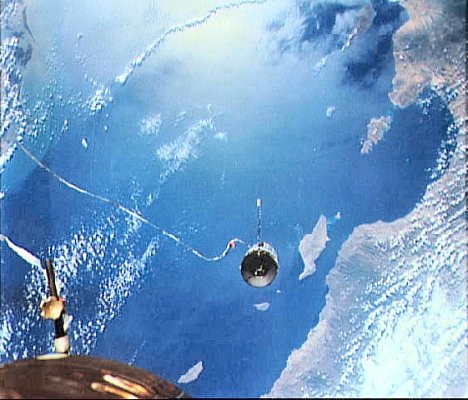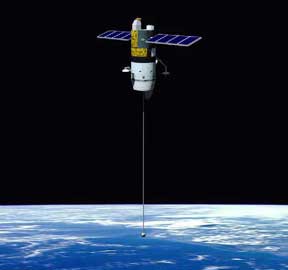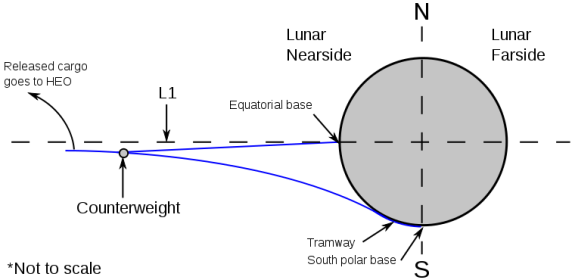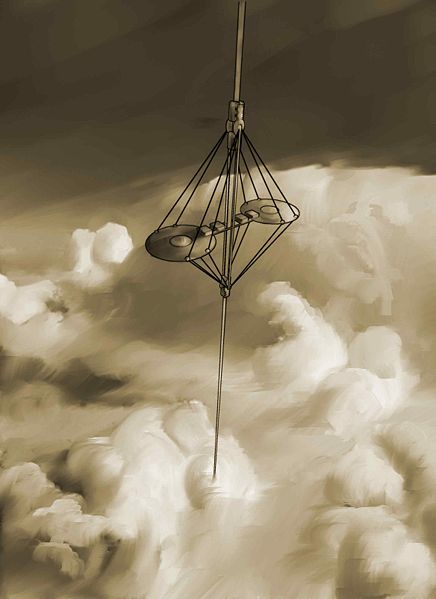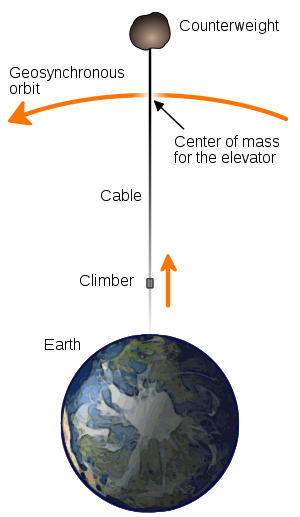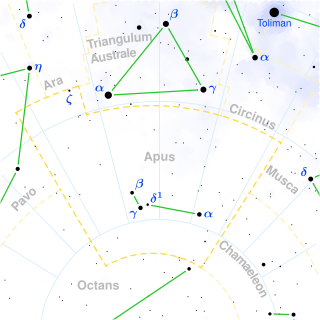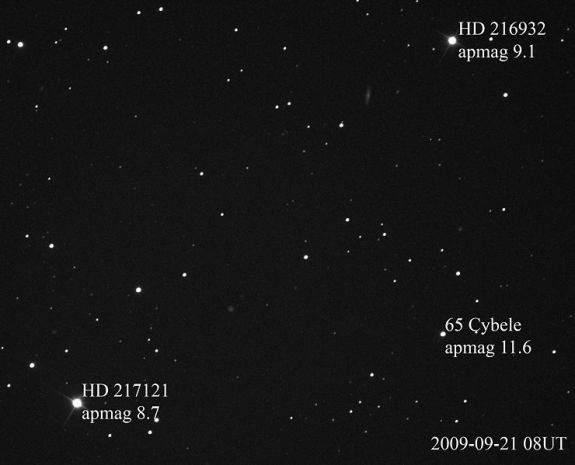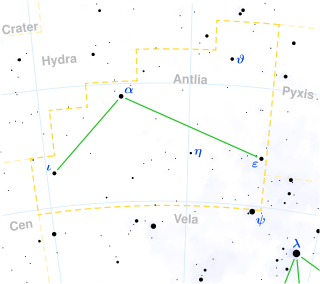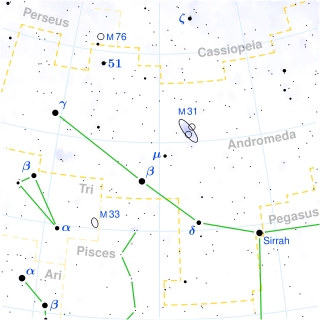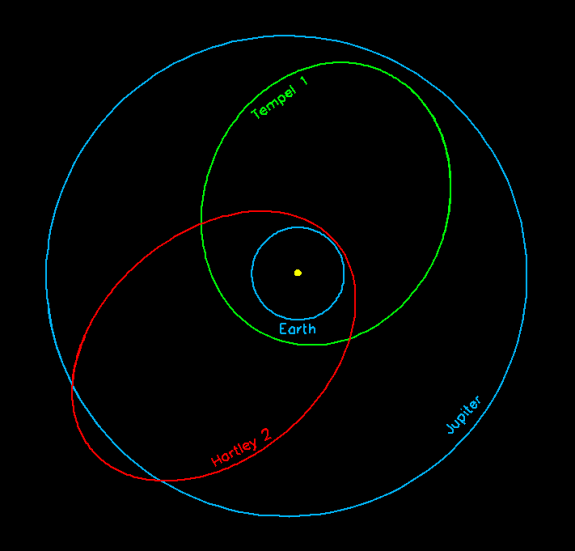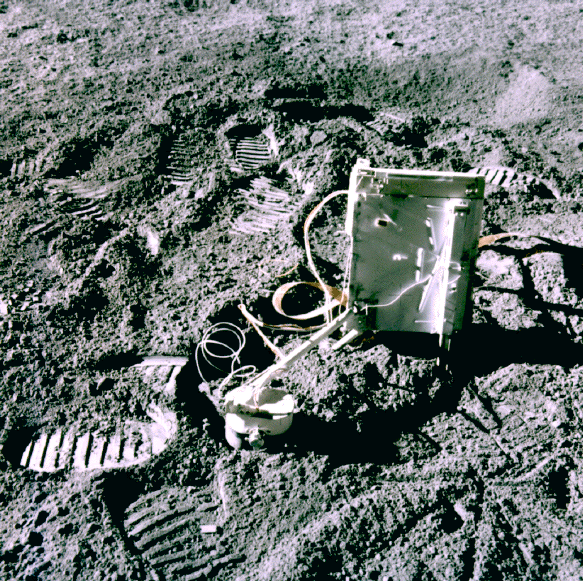Non-Rocket Spacelaunch – Tether satellite missions
This is the second part to the article about tether propulsion. It will focus on space missions that tested tethers in space. The first such mission took place in 1966. Gemini 11 deployed a 30m tether connecting it to the Agena target vehicle. It created a small amount of artificial gravity (0.00015 g) by spinning the two spacecraft.
Non-Rocket Spacelaunch – Tether propulsion
Tether propulsion consists in using long, very strong cables (known as tethers) to change the velocity of spacecraft and payloads. The tethers may be used to initiate launch, complete launch, or alter the orbit of a spacecraft. This form of propulsion would be significantly less expensive than spaceflight using modern rocket engines.
Non-Rocket Spacelaunch – Space Elevators in Fiction
This is the fourth and final part of the space elevator article of the non-rocket spacelaunch methods article series. This post will focus on references to the space elevator concept in fiction. The first mention of anything remotely similar to a space elevator was the beanstalk in the children's fairy tale called Jack and the Beanstalk, published in 1807.
Non-Rocket Spacelaunch – Extraterrestrial Space Elevator Concepts
Space elevators, a futuristic concept, could be adapted for various celestial bodies: Mars, the Moon, and even asteroids, they promise a revolution in space access.
Non-Rocket Spacelaunch – Space Elevator Safety Issues
The space elevator is a gigantic concept and as such it has many safety issues that would have to be resolved before construction begins. A space elevator would present a navigational hazard, both to aircraft and spacecraft.
Non-Rocket Spacelaunch – Space Elevator
Why non-rocket spacelaunch? Because the current chemical rockets are really expensive. In order to further explore outer space and establish a permanent human presence in space we need more cost efficient spacelaunch methods.
Apus Constellation
Apus is a faint constellation in the southern sky. Its name means “no feet” in Greek and it represents a bird-of-paradise, which were once believed to have no feet. It was one of the twelve constellations created by Petrus Plancius in the late 16th century. The first known depiction of the constellation in a celestial atlas was in Johann Bayer’s Uranometria of 1603. Bird-of-Paradise after which the Apus constellation was named. Credit & Copyright: Roderick Eime. For more constellations see the Constellations Guide.
Introduction to Astronomy – Apparent magnitude
Yesterday I have used the term “apparent magnitude” in my article about the Antlia Constellation. Since some of you may be new to astronomy, I decided to start a new series of articles to introduce you to the topic. Each article of the series will focus on one scientific term used in astronomy. The series will not be a regular one: I will only write an article after using a complicated astronomy term that some of you would need me to explain. Definition The apparent magnitude (noted as m) of a celestial body is a measure of its brightness as seen by an observer on Earth. Since the apparent brightness…
Antlia Constellation
Antlia is a constellation in the southern sky and therefore has been unknown to the ancient Greeks and Romans. Its name means “pump” and it specifically represents an air pump. It was created by the French astronomer Abbé Nicolas Louis de Lacaille, who created fourteen constellations for the southern sky to fill some of the faint regions. He originally named it Antlia pneumatica to commemorate the air pump invented by the French physicist Denis Papin. It was later adopted by the International Astronomical Union as one of the 88 modern constellations under the shortened name of Antlia. Main Stars and Deep Sky Objects The Antlia constellation has no bright stars.…
Andromeda Constellation
Andromeda is a constellation in the northern sky. It was one of the 48 constellations listed by the 2nd century astronomer Ptolemy, and it remains one of the 88 modern constellations today. The Andromeda Galaxy is named after the constellation, as it appears within its boundaries.
Hartley 2 Comet
Comet Hartley 2 has made it to the news recently: first because of the comet's flyby near Earth and then due to it being visited by the Deep Impact spacecraft.
Did you know? The Moon has an Atmosphere
It is a common misconception that the Moon’s surface is a perfect vacuum. It is not! The Moon indeed has an atmosphere, a very tenuous one however. If you could capture the Moon’s entire atmosphere, it would weigh about 10,000 kg. In other words, it would weigh less than a large truck. Sources of the lunar atmosphere There are two main sources of the lunar atmosphere. One of them is outgassing, which is the release of gasses that originate from radioactive decay processes deep inside the crust and mantle of the Moon. The second source is through a process known as sputtering: atoms are ejected from solid materials on the…

